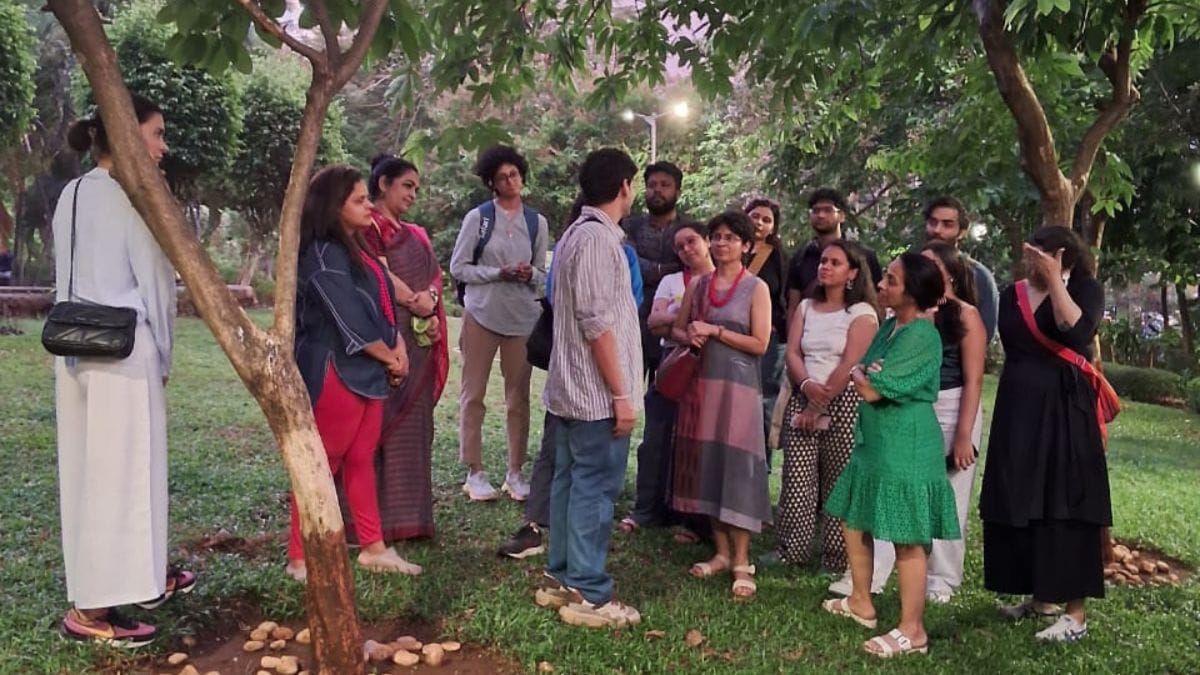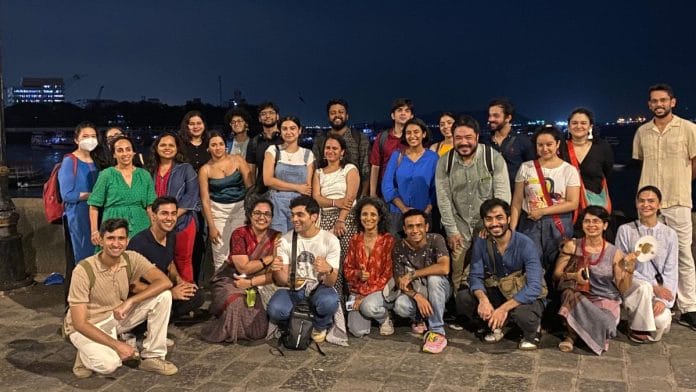Mumbai: In the fading light of day, a man made his way through a crowd of 20 people at the Cooperage Bandstand Garden in Mumbai’s Fort area and said: “Far away from the prying eyes, we emerge under the night skies.”
It’s a scene from writer and director Vikram Phukan’s ‘Postcards from Colaba’. This is no street play or skit, but a heritage walk with a twist. Styled like a performative play — straight out of a scene from Bridgerton — it spotlights South Mumbai’s underground queer scene and gender norms.
Filmmaker Riyad Vinci Wadia, who made BOMgAY back in 1996, his grandaunt ‘Fearless Nadia’, who upended stereotypes by becoming a stuntwoman in Bollywood, and thespian Sultan ‘Bobby’ Padamsee all found mention in the walk.
Vignettes of young love at Mumbai University’s Fort campus, and secret meetings at Gokul bar in Colaba added another layer to this performative heritage walk.
For 90 minutes in the non-monsoon months between October and April, Phukan and his troupe of seven actors lead participants on a one-kilometre walk through famous spots such as the National Gallery of Modern Art and the Regal Cinema. Six shows are conducted every two months, with tickets priced at Rs 500.
“Queer narratives have shifted from fitting a specific mould to celebrating authenticity that prioritises storytelling with true experiences. Our aim is to tell the story authentically, without political undertones or the pressure of representing a pivotal experience in the queer community,” said Phukan.
The group stops at Regal Cinema, the art deco theatre that opened its doors in 1933. Three actors from the troupe step forward, and through a skit show how this landmark of Colaba was also a refuge for the queer community. It gave them “the wings to fly” and “escape the world”. It’s where they watched movies like Deepa Mehta’s Fire (1996), one of the first mainstream Bollywood films to spotlight homosexuality, and Hansal Mehta’s Aligarh (2015), based on the real-life story of an Aligarh Muslim University professor who was suspended for being gay.
With witty one-liners, the characters in ‘Postcards from Colaba’ declare their crush on Hollywood actor Timothee Chalamet. The audience burst into laughter and a round of applause. What started as banter ended in an emotional monologue, making everyone contemplate love from a queer person’s gaze.
“I loved the fact that the walk is a merger of three different topics—colonial architecture, nostalgia, and queer representation. The fact that the walk is free-flowing, but with people immersed into a different world amidst surrounding noises was something I enjoyed,” said Nikhil Shah, a 40-year-old consultant who participated in the walk.
How postcards came to be
Vikram Phukan conceived ‘Postcards from Colaba’ while working with theatre artists on a project in the United Kingdom.
“As part of my theatre work, The British Council, along with the Queer Muslim Project, had brought an international poetry cohort to India. Someone from this cohort suggested that I conduct this exercise as a walk,” said Phukan.
He recruited actors through his theatre networks, and began conducting “sensitisation workshops” with them in Colaba. The performers read and researched extensively in order to prepare for their roles.
Phukan’s heritage walk is now two years old, but he’s always looking for new iterations, new stories.
As the group progresses from Cooperage Bandstand Garden, they stop outside a ground near the Rajabai Clock Tower. Actor Sahir Mehta, playing Riyad Vinci Wadia, steps forward.

In a crisp English accent, he talks about BomGAY, and recounts his relationship with Australia-born actress Mary Ann Evans aka ‘Fearless Nadia’, who was his grand-aunt.
Vinci Wadia, who died at the age of 36 in 2003 due to tuberculosis of the stomach, had also made an acclaimed film on Nadia called Fearless: The Hunterwali Story (1993).
Participants remain gathered around the actors, immersed in the experience with the help of earphones so that they don’t miss out on anything. Voiceovers guide them through the noisy, bustling bylanes of Colaba. Interactive elements, such as letter reading from the perspective of queer figures, and the occasional film trivia, make the walk more engaging and add to its emotional richness.
“The rationale was to keep the audience engaged rather than make it a formal question-and-answer session seen in typical heritage walks,” said Phukan.
Also read: When Shabana Azmi vowed to quit acting—she was humiliated on set by a choreographer
On queer history, representation
Most participants in the walk, according to Vikram Phukan, are “cis-het women”. But the performance is so relatable that everyone can take something back with them. Almost all the participants want to know more about the experience of members of the LGBTQIA+ community in Mumbai (and the rest of India), where homosexuality was a crime until 2018.
This shift, Phukan said, happened over the past six or seven years, when queerness began to be labelled and understood in a different vein.
People always look for universal aspects in the walk, he added. But for the troupe, queerness is very specific. Phukan “didn’t want to tailor their stories to the expectations of universality in order to do justice to queer stories”.
“Even though the stories sometimes change track, there’s a continuity in the lived experiences of queer people in such mainstream spaces,” he said.
As the walk progressed, actor Anmol Oberoi narrated the tale of a fictional person called ‘Dulce de Leche,’ named after a popular caramelised confection.
The character, while on a date near the famous Gokul restaurant, realises later that he had met his companion several years ago in Colaba.
As the act comes to a close, audience members are given chocolates of a similar flavour. It’s a sweet interlude in the walk.
“I think audiences now feel a little trapped in theatres and cinemas, especially. The walk was a great medium to experience art outside in the open,” said one of the participants, Farhana, a 50-year-old artist.
The walk concluded near the Gateway of India, with two male characters speaking of their unconditional love for each other – an homage to the 2017 film Call Me by Your Name.
(Edited by Zoya Bhatti)






